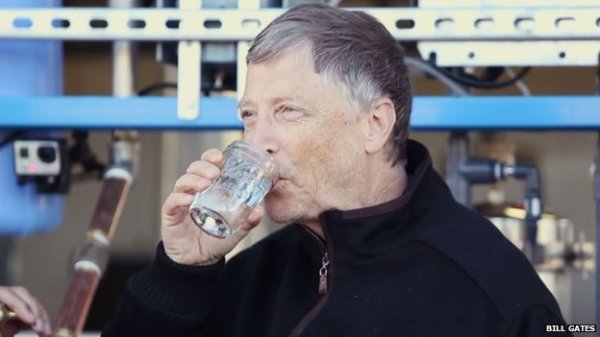Bill Gates has drunk a glass of water made from human faeces, to showcase technology he said could provide clean water in the developing world.
The Microsoft founder said he wanted to begin sending processing plants around the world after tests later this year.
The project was welcomed by WaterAid, which said that it could particularly help in urban areas.
According to the charity, some 748 million people worldwide lack clean drinking water.
In a video posted on his blog, Mr Gates watched as the human waste was fed into the processor, before drinking the end product from a glass.
‘Sewer sludge’
“The water tasted as good as any I’ve had out of a bottle. And having studied the engineering behind it, I would happily drink it every day. It’s that safe,” he wrote in the blogpost.
In the video, the developer of the Omniprocessor system, Peter Janicki, says the raw “sewer sludge” is first boiled, during which process the water vapour is separated from the solids.
Those solids are then put into a fire, producing steam that drives an engine producing electricity for the system’s processor and for the local community.
The water is put through a cleaning system to produce drinking water.
“Why would anyone want to turn waste into drinking water and electricity?” Gates asked.
The answer, he wrote, was because “diseases caused by poor sanitation kill some 700,000 children every year, and they prevent many more from fully developing mentally and physically”.
He added: “If we can develop safe, affordable ways to get rid of human waste, we can prevent many of those deaths and help more children grow up healthy.”
Sustainable services
According to a report released by the World Health Organization and Unicef in 2013, data collected two years earlier showed that 2.5 billion people worldwide lacked “improved sanitation facilities”.
Figures from WaterAid suggest that the number of people in the world without access to safe water has fallen by about 20 million since then.
The charity said that the technology could “first and foremost benefit those who already have some access to sanitation, rather than those without”.
“If the technology can be rolled out at a scale that makes it viable for smaller investors or entrepreneurs, then this could be a catalyst for changing the sanitation landscape in urban areas in the developing world,” said its sanitation technical support manager, Ada Oko-Williams.
WaterAid said the introduction of this type of plant could “help to facilitate the need to complete the sanitation cycle, by creating a market for the creation of a sustainable services around the safe collection, transportation, treatment, disposal, and indeed reuse of human waste”.
‘Seed money’
Mr Gates said that a pilot of the Omniprocessor was due to go ahead in Senegal later this year and that he hoped to begin sending working plants to India and other countries soon after.
“If we get it right, it will be a good example of how philanthropy can provide seed money that draws bright people to work on big problems, eventually creating a self-supporting industry.
“Our goal is to make the processors cheap enough that entrepreneurs in low- and middle-income countries will want to invest in them and then start profitable waste-treatment businesses.”
But he acknowledged that “the history of philanthropy is littered with well-intentioned inventions that never deliver on their promise”, adding that he hoped the planning undertaken on the Omniprocessor project would mean that it did not join this list.
The project was funded by the Bill and Melinda Gates Foundation.






Leave a reply